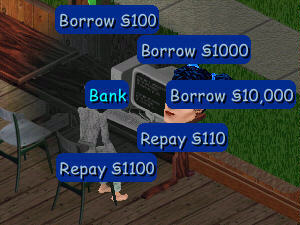Wednesday 30 April 2003

|
Pic of the day: Even the Sims can now do their banking in their PJs, thanks to Cheap Frills .org. Don't leave your Sims without it ... at least if you want to play a typical Norwegian family. (Or even an atypical one.) Invisible moneyToday is the last days for common people to send in our tax return forms. These have been much improved in recent years, as the tax authorities now list your income and property rather than just waiting for you to fill it in. And, unlike the bad old days, you can send your tax return over Internet, automated phone, or SMS (mobile phone text messages). More and more people do this. I sent mine over the Net this morning. Around the same time came the news that last year, for the first time, we Norwegians paid more bills electronically than by mail. Most people here have already long ago stopped going to the bank or post office to pay their bills. And check books haven't been used for so long, I'm not quite sure if they're legal anymore. Certainly people would look at you funny if you pulled out a check book in the supermarket. I can't say the last time I saw that, but I'm pretty sure it was more than 10 years ago. These days, people pay with card, usually Visa. Credit cards dominate Internet shopping though, and we do more and more of that too. What struck me was how money becomes more invisible, more abstract. I guess in a way that's the truth about money: It has been a long time since money was valuable in itself, and not just as a symbol. ***Historically, our tradition of money goes back to the pieces of valuable metals at the dawn of civilization: Gold, silver and copper. These metals were easy to purify and easy to shape into beautiful and lasting works of art. Gold was particularly sought after; its immunity to corrosion was not just very useful, it also made it ideal to bring into the afterlife, which was assumed to last for a really long time too. Since these metals were so valuable compared to their weight, people started to use bits of them as payment for other goods ... after all, you could easily barter them for something else again. Even if you were not interested in gold and silver yourself, you always knew someone who was. At the very least the king, chieftain, pharaoh or whoever ruled the realms. Over time, people came to use standard sized pieces of metal, and then it was a short way for the king to put his stamp on such pieces to guarantee their validity (and threaten to kill anyone who made counterfeit). This is pretty much how things lasted for the next few millennia, with one exception: The kings themselves soon found out that no one could threaten them if they mixed more and more iron into the coins. So eventually the value of the coin was not based on its metal content, but on the ability of government to back it up. According to my history books, the Chinese invented printed paper money, and Marco Polo saw it there during his visit to the Mongol/Chinese empire during the renaissance. Since the metal content was no longer a big deal anyway, paper money took off. Of course, without a reliable government the money wasn't worth the paper it was written on. During the Great Depression before WW2, people in Germany supposedly brought a wheelbarrow to get their wages, and on the way home it lost its value and was used to wallpaper the bathroom. I'm not sure how much of this is poetic license, but it neatly illustrates the danger of inflation. Of course, politicians as well as other people of that time were less intelligent and less educated than today. Then again, most people (and indeed most politicians) today are less intelligent than you and me, so weird things may still happen. ***Various derivatives of money appeared: The money order and check are supposedly still used in the USA, I vaguely remember mention of the money order from more than 20 years ago but I don't think I have ever seen any. The banking system in Norway moved on to electronic transfers fairly early; at first only between banks, but eventually it spread to the customers. For a while minibanks (ATM as they are called in English) reigned supreme; but now it is more common to get cash in the shops while you pay with your card anyway. It is still practical to use cash to pay newspapers from the kiosk, but already you can get cola from a vending machine by sending a code from your mobile phone. With the extreme mobility of money, unimaginable amounts cross the borders each day. Even the mightiest countries need to keep half an eye on the speculators who make or break fortunes by trading in currencies. An even so, currencies don't really exist. They are just our abstractions to get our barter done. But we have made our own reality, we are lost in our dream. I once briefly glanced at a Marxist publication publication. If I remember correctly, it showed the usual Darwinian progression from fish to four-legged animal to ape to human ... and then at the end, it changed into a dollar sign. Is this the goal of the human race? Sometimes it seems so; but the race is still on. |
Weatner is getting better. |
Yesterday <-- This month --> Tomorrow?